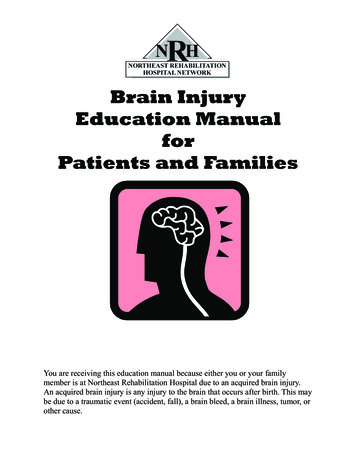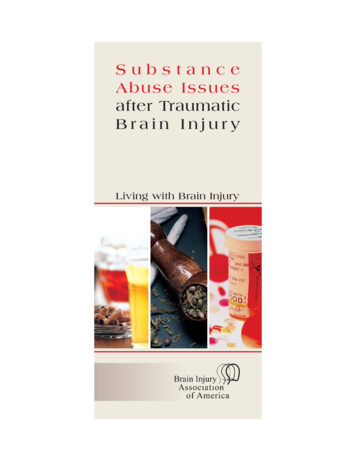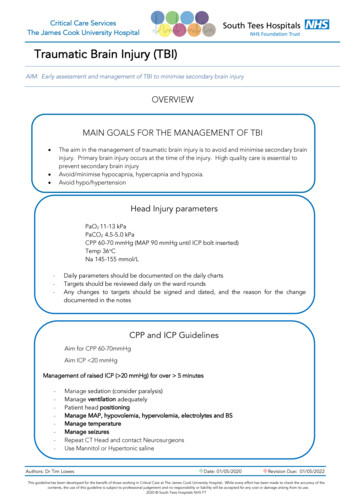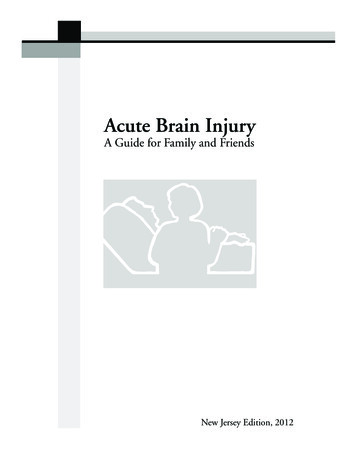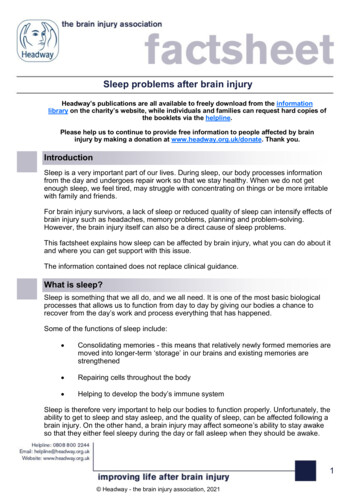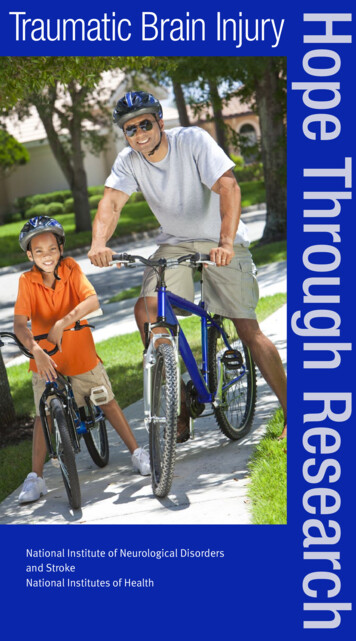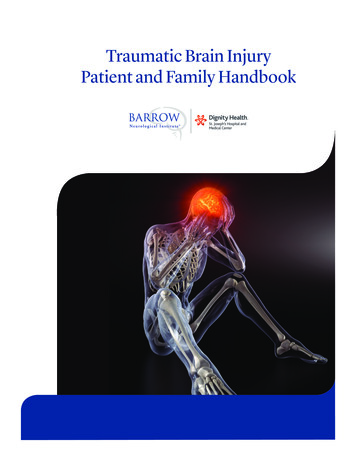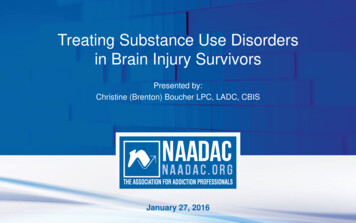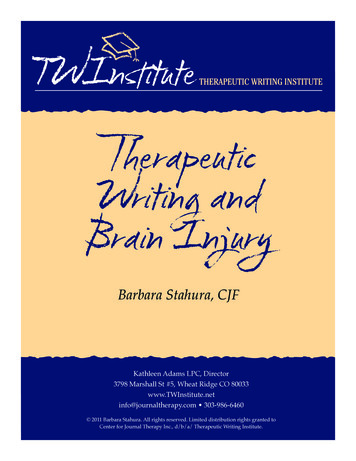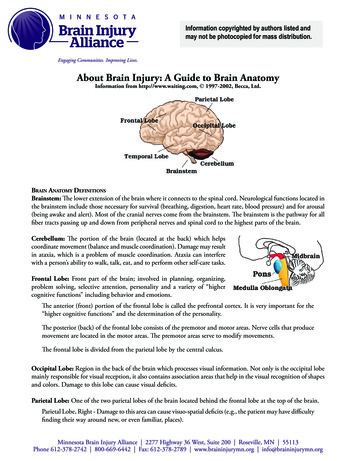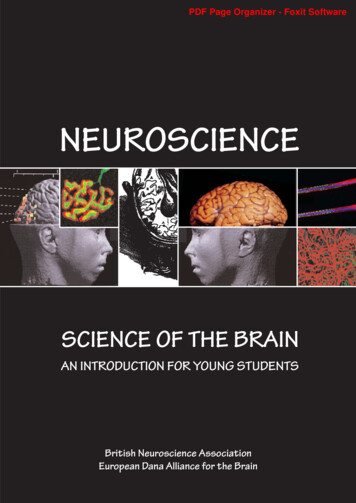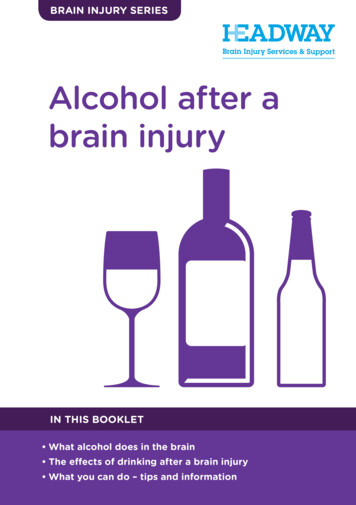
Transcription
BRAIN INJURY SERIESAlcohol after abrain injuryIN THIS BOOKLET What alcohol does in the brain The effects of drinking after a brain injury What you can do – tips and information
Brain Injury SeriesThis booklet was written for, and with, people with anAcquired Brain Injury. Our sincere thanks to everyonewho contributed.An Acquired Brain Injury is an injury to someone’s brainthat happens during their lifetime. It can be caused bya stroke, an infection, lack of oxygen, surgery or a headinjury, for example. Throughout this booklet, we use thephrase ‘brain injury’ to refer to an Acquired Brain Injury.If you have any feedback on this booklet, or would likefurther information or support, contact us ont: 1890 200 278, 01 6040 800 or e: info@headway.ie.Visit www.headway.ie/information to see our sourcesand contributors. You can also read, download orrequest copies of other booklets in this Brain Injury Series.Please note: we have done our best to provideinformation that is correct and up-to-date. However,we cannot be responsible for any errors or omissions.Everyone’s brain injury affects them differently. Youshould not consider the information in this bookletas a substitute for getting advice from a doctor orother professional.Booklet concept and content development:Brain Injury Information and Support Team, Headway Ireland.Lead: Ruth Lunnon, Senior Information and Support Worker.See headway.ie/information for further details. Headway Ireland 2017. Next review due in 2019.All rights reserved by Headway Ireland.2
Contents:Introduction. p 1Should people with a brain injurydrink alcohol?. p 2Eight points for you to consider . p 2-5What you can do to cut downor cut out alcohol. p 6Some signs of a drinking problem. p 7Help and information. p 8What the symbols mean:Key points on alcohol and brain injuryWhere to get more help and informationUseful tipsPeople with brain injuries sharetheir experiences“I developed epilepsy because of my injury. Drinkingtriggered my seizures so I decided to give upbecause for me prevention was far better than cure.It was hard at first but I feel better in general nowand have more money in my pocket.”Damien, Co Kerry3
IntroductionAfter a brain injury, many people want to know whenthey can go back to having a drink or if it is safe todrink at all.We have produced this booklet to: Help answer these questions. Suggest ways to reduce the amount of alcohol youdrink or how to avoid it. List where to get more information or support if youneed it.Alcohol is widely consumed in Ireland. However, it is adrug that has powerful effects on our brains. Alcoholworks by changing our brain chemistry. This is whatmakes us feel relaxed, happy or sad when we drink.A brain injury causes a loss of brain cells and maycause scar tissue. This can affect how well our brainworks. The damage to the brain makes it moresensitive to alcohol and other drugs. We don’t yet fullyunderstand all the ways that alcohol affects an injuredbrain. What we do know is that the effects are greaterand are not easy to predict.Any substance such as alcohol or drugscan affect how our brain works whether wehave a brain injury or not. For people witha brain injury, the effects of drugs or alcoholare increased.1
Should people with a braininjury drink alcohol?This is a decision that brain injury survivors are facedwith as they recover. Some people find they lose theirtaste for alcohol and do not find it hard to give up.However, many people want to get back to having afew drinks.The reality is that drinking after a brain injury comeswith a number of risks. In making your decision, wesuggest you talk to people you trust and consider thefollowing eight points.If you decide you want to cut down or stop drinking,you will find useful tips and advice on pages 6 to 7.1. A lcohol has a greater effect on you due to yourbrain injury. Your tolerance for alcohol is likely to be reduced.This means that the normal guidelines for safeamounts to drink per week are too high for peoplewith a brain injury. Most people find they becometipsy, light-headed or sleepy with less alcohol thanbefore. If you are driving it is not safe to drink at all. You are likely to become intoxicated more quickly. You may react to drinking in ways you don’t expect– for example, becoming aggressive, disorientated orhaving a seizure (see page 4 for more on seizures).2
2. Alcohol can slow down, or hinder, your recovery. Recovering from a brain injury can take longer thanyou think. Many people continue to recover formonths or even years after their injury. Your brain has to work extra hard to re-learneveryday things as you recover. Drinking canslow down your progress. Drinking alcohol can prevent you from making thefullest recovery possible. Alcohol can also make it more difficult to learn newinformation or skills.3. Alcohol affects memory, concentration andthinking skills. A brain injury may reduce your ability to payattention, concentrate, remember things or processinformation quickly. Drinking will make thesedifficulties worse. When you are drinking, you will be less able to useany coping strategies you have learned for dealingwith memory difficulties or other problems. If you are drinking on a night out and your memoryis already poor, you may be putting yourself at risk.You could lose your keys, phone or money and havedifficulty getting home safely.3
4. D rinking can increase the chance of having asecond brain injury. Statistics show that having a brain injury increasesthe chance of you suffering a second one. Drinking increases the chance of suffering a secondbrain injury even more. The most likely reason isthat alcohol increases the effects of any difficultiescaused by the brain injury – for example, balance.5. Alcohol can cause seizures (fits) after abrain injury. If you drink alcohol after a brain injury, you aremore likely to have a seizure even if you have nothad one before. If you are taking anti-seizure medication, drinkingcan prevent it from working properly.6. Drinking increases difficulties with talkingand understanding. If your brain injury has affected your speech,being under the influence of alcohol can maketalking harder. Drinking may also make it more difficult for you tounderstand what people are saying. If drinking makes communicating more difficult,it can cause frustration, confusion and arguments.4
7. Alcohol makes poor judgement andimpulsivity worse. The Frontal lobes (and other linked parts) of ourbrain help us to avoid doing things that may offendother people, cause trouble or be too risky. After abrain injury, our ability to avoid these difficulties canbe reduced. Drinking makes difficulties like this worse. You mayfind it hard to control what you say or do – forexample, taking risks, saying exactly what you thinkor doing things you later regret. If anger or mood swings are affecting you since yourinjury, there is support available. See Headway’sbooklet Anger, irritability and mood swings for tips,information and who to contact (see page 8).8. If you feel depressed or anxious, alcohol can makethis worse. After a brain injury, you have a higher chance offeeling low or depressed. Drinking can makethis worse. Alcohol can also make you feel more anxious. If anxiety or depression are affecting your life,contact your GP. See Headway’s booklet Feelinglow or anxious for more advice and information(see page 8).5
What you can doNot drinking increases your chance of making the bestrecovery that is possible for you. It is much easier tomake changes in your life if you replace one habit (forexample, going to the pub) with a new habit (going toa new group or activity). Get support from family and friends to help you tocut down or stop drinking. Replace alcoholic drinkswith non-alcoholic ones instead. Meeting up with other people may help. Manypeople find it beneficial to talk to others goingthrough similar challenges. See page 8 for somesupport organisations. Refusing a drink can be awkward. Make it easier byplanning ahead. Be ready with a phrase such as ‘Nothanks. Since my injury I feel better if I don’t drink.’ Make a list of your reasons to stop drinking anda list of the benefits of stopping. Any time yourdetermination weakens, read back over the lists tokeep yourself motivated. Keep a note of how you are getting on. Rewardyourself when you make positive changes. If you use alcohol to cope with stress, emotionslike anger or feeling low, try other ways of dealingwith them. Ideas to try are doing relaxed breathing,meditation or gentle exercise, talking to someoneyou trust, doing a hobby or something else relaxing.6
When meeting friends, suggest other places ratherthan just the pub – for example, bowling, a concert,the cinema or go to a café to talk instead.Alcohol can interfere with prescriptionmedication. Talk to your GP about this.Some signs you could havea drinking problem Drinking early in the day to steady your nerves or to‘get going’. Trouble at home due to your drinking. Drinking faster than other people or having a quickextra drink at the bar when you are ordering.If you think you have a problem: Talk to someone you trust. If somebody close to yousays they think you have a drinking problem, try totake what they say on board. Get support. Having a brain injury can make it harderto give up alcohol and other substances. Make an appointment with your GP. Bring thisbooklet with you. Contact the HSE’s confidential Drugs and AlcoholHelpline on 1800 459 459 or email: helpline@hse.ie.7
Help and informationFor more tips on cutting down on alcoholwww.drugs.ie/alcohol info/tips tools/tips fordrinking coholN.b. The usual guidelines given on websitesfor safe amounts to drink per week are toohigh for people with a brain injury.For drinking problems:HSE Drugs and Alcohol Helplinet: 1800 459 459 e: helpline@hse.ie.Visit www.drugs.ie/services for a list of services andspecialist drug and alcohol treatment programmes.Alcoholics Anonymous has support meetingsthroughout Ireland for people with problem drinking.t: 01 842 0700 w: www.alcoholicsanonymous.ieBrain injury supportHeadway offers community-based brain injury groups,psychotherapy, counselling and rehabilitation in Cork,Dublin, Kerry and Limerick. Contact us to get copiesof other booklets in this Brain Injury Series or readthem online.Headway Helpline t: 1890 200 278 or 01 6040 800w: www.headway.ie8
Charity Number: CHY 74179web: www.headway.ieemail: info@headway.ietel: 1890 200 278 or 01 6040 800
An Acquired Brain Injury is an injury to someone's brain that happens during their lifetime. It can be caused by a stroke, an infection, lack of oxygen, surgery or a head injury, for example. Throughout this booklet, we use the phrase 'brain injury' to refer to an Acquired Brain Injury. If you have any feedback on this booklet, or would like
